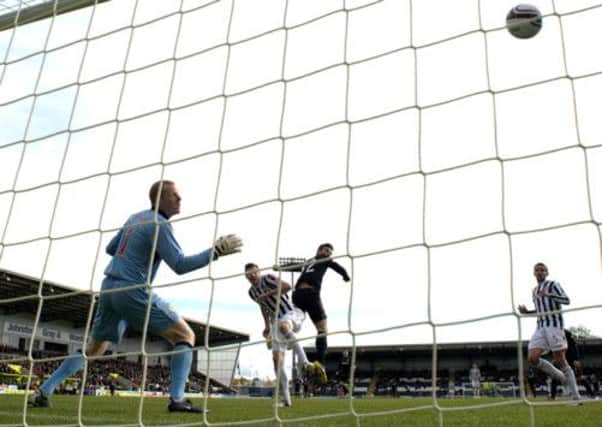Alan Pattullo: SPL brand in bleak light


Never mind that he is the Rangers chief executive. Never mind that the Ibrox club must engage with the task of selling season tickets ahead of next season’s Second Division campaign, which, with the novelty of playing lower league football wearing ever thinner, is a hard enough task, without the CEO putting a further downer on things.
This is not the only reason why Rangers’ shares lost £5 million of their value earlier this week, but Green’s assertion contributed to it – as have a few other comments offered by the Yorkshireman in unguarded moments recently. Often, the business world is characterised as ballsy and hard-hearted. But, conversely, it can also be incredibly sensitive, prone to reacting nervously to thoughtlessly uttered words. Customers don’t need much incentive to put them off, and this is particularly so in the testing financial climate that we face now.
Advertisement
Hide AdAdvertisement
Hide AdThe definitive illustration of this remains Garald Ratner’s throwaway remark – or at least what he had hoped might just be a throwaway remark – concerning a sherry decanter, which, during a speech at the Institute of Directors in 1991, he described as “total crap”. He reportedly wiped £500 million from the value of his company thanks to this comment, as well as another made during the same speech about his stores’ ear-rings being “cheaper than an M&S sandwich, but [they] probably wouldn’t last that long”.
So what are we to make of a succession of Scottish Premier League chairmen and chief executives now having to do a frantic volte face after spending much of the last few weeks insisting that the Scottish game will perish without league reconstruction, and that is already dying in any case? In their drive to portray their league reform package as an essential ticket, these officials often resorted to apocalyptic language. Last week, many urged Ross County and St Mirren to think again or else condemn Scottish football to a nuclear winter. It was presented as this stark a choice.
“The game has been on a downward trend for the past few years,” stressed Peter Lawwell, the Celtic chief executive, at the weekend. “I would see no reason for that to change if we stay the same.”
It’s not much of a rallying cry ahead of next season, is it? Or even ahead of this weekend, when Celtic host Inverness Caledonian Thistle. It might be the afternoon when the Parkhead club are confirmed as SPL champions, yet Celtic, to their credit, are already making efforts to publicise the match, in the knowledge that not even the prospect of success can attract a full house to Celtic Park these days. Winger James Forrest has been put up for interview today “to promote ticket sales for our match against Inverness Caledonian [Thistle] on Sunday” – a full five days before the game.
Stephen Thompson, the Dundee United chairman, has acknowledged the problem now facing those such as himself and Lawwell, who heavily promoted the idea that 12-12-18 was the only way forward. He admitted it was not perfect when meeting fans of his own club, but Thompson believed in it as a package, and as an alternative to what he described as the “slow decline” of Scottish football.
Now, he admits, it is a case of having to “batten down the hatches and getting on with it”. He added: “There are a lot of wounded bodies out there.”
As far as United are concerned, they at least have several promising youngsters to help stimulate interest. The Tannadice side paraded a couple of these talents on Sunday, when they were unfortunate to lose a Scottish Cup semi-final against Celtic. The 17-year-old Ryan Gauld shone, as did the even more tender-aged John Souttar, who, at only 16 years old, excelled at centre-half. A statement by the club on Monday quickly sought to accentuate this positive and highlighted United’s “vibrant” youth policy, although it also lamented the failure from earlier in the day to “breathe new life into the game”.
Perhaps the problem is more pronounced in Aberdeen, with Stewart Milne having rounded on Stewart Gilmour most fiercely following Monday’s vote. The Aberdeen owner accused the St Mirren chairman of “killing the game” and he painted another bleak picture of how the Scottish football landscape was now going to look.
Advertisement
Hide AdAdvertisement
Hide Ad“We have sent out a horrendous message to potential sponsors by rejecting the reconstruction proposals,” said Milne, who is fighting an already losing battle to re-ignite supporter interest in his own club after years of decline. A move to a new stadium has been shelved, while, on the pitch, Aberdeen are preparing to begin a fourth successive bottom-six programme. Now Milne must get on with the job of selling season tickets in a downbeat climate that he, and others within the SPL, have helped engender, as they sought to put the frighteners on those who might be wavering in their support for league reconstruction, while trying to convince those who had already made clear their objections to change their minds.
As far as Ratner was concerned, the tale had a happy ending. He built up a successful online jewellery business. However, as a high street entity, Ratners never recovered from being so publicly disparaged by its founder. And therein lies a salient lesson, although perhaps it is already too late.